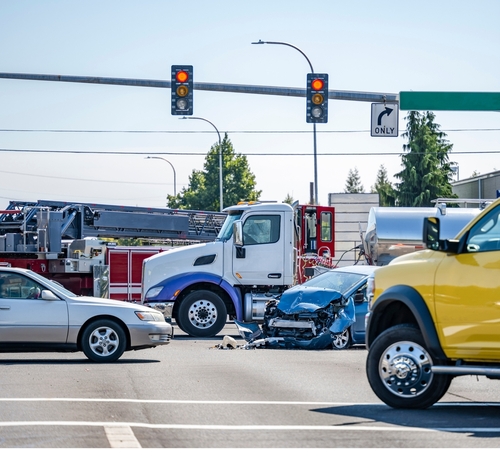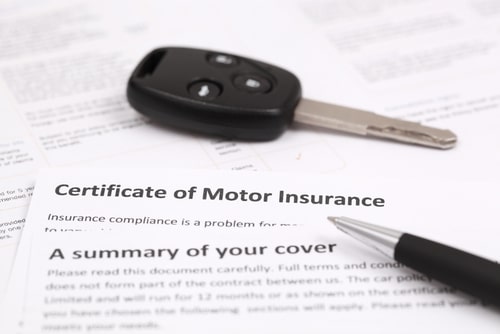Car accidents are an everyday occurrence in Indiana. Auto accidents often result in serious injuries, damages to the vehicles involved, and in the more tragic of accidents, death of one or more of the people involved in the accident. According to the Insurance Institute for Highway Safety Loss Data Institute, there were 845 fatal accidents in 2014 that resulted in 924 total deaths.
Those are just two of the sobering statistics regarding Indiana car accidents. Car accident statistics and other vital facts regarding automobile accidents in Indiana, what frequently causes them, and the proper manner in which to proceed after a car accident occurs are often shrouded by ubiquitous myths. In order to ensure that you are not befuddled by common auto accident myths, you should familiarize yourself with the ones that have become popular and then learn the facts.
With that said, here are four common car accident myths you should never fall for:
- State laws regarding car accident and injury lawsuits – and the compensation that comes along with lawsuits and settlements – are the same everywhere. (Incorrect!) When you cross the border from Indiana to Kentucky, you travel from what is considered a “fault” insurance state into a “no-fault” car insurance state. The difference in how you file insurance claims and personal injury lawsuits in neighboring states can vary greatly, let alone if you travel across the country. In “fault” states, if you are injured or your car is damaged, you are supposed to file the insurance claim with the driver who was found at fault, instead of filing a claim with your own insurance company. Some states, including Indiana, use a calculation called “modified comparative fault,” which means that more than one party can be found at fault for the car accident. Parties found at fault may still receive compensation for damages and injuries, however, the amount of compensation is reduced by the percentage they are liable for, according to the modified comparative fault equation. For example, a driver who is found 30 percent responsible for an auto accident will only be able to recover 70 percent of the compensation for their damage and injuries from the accident. However, if a driver is found to be 51 percent or more at fault for the accident, they cannot recover any compensation for the damages and injuries. One final thing to keep in mind regarding car accident and injury laws is the personal injury claims statute of limitation in each state can differ. This is the time limit you have to file a personal injury lawsuit after an injury occurs. In Indiana, the amount of time you have is two years.
- You will automatically receive compensation for your damages and injuries if you file a car accident claim or personal injury lawsuit. (Incorrect!) Car insurance companies are notorious for denying auto accident claims. Do not believe that just because you file a car insurance claim, you will receive compensation. Additionally, these companies are just as notorious about offering the least amount of compensation possible to injured claimants. You have the right to consult with and hire an attorney to handle your car insurance claim to ensure that you will receive the maximum amount to cover your outstanding medical bills, lost wages, damages to your vehicle, and any future medical needs you may have. In the case of personal injury lawsuits, the stakes get higher and the proof becomes more important. In order to receive a favorable verdict or a settlement in a personal injury lawsuit, you will need to prove several things:
- The negligent driver caused the car accident to occur;
- The accident was the direct cause of your injuries and damage; and
- The compensation you are requesting is directly related to the injuries or damage that the negligent driver caused.
In both of these cases, an experienced Indiana auto accident attorney can help you gather the appropriate evidence to prove your claims. They can also file the requisite paperwork to ensure that you get the compensation you are entitled to. Do not expect to receive automatic compensation, because that does not happen, and if it does, you have most likely settled for the least amount possible for your claim.
- Your insurance company works for you. (Incorrect!) Most people believe that their insurance company works for them and looks out for their best interests. While Indiana is a “fault” state and you would normally file an insurance claim with the at-fault driver’s insurance company in the event of damages to your vehicle and your injuries, what would happen if the driver was uninsured? In that case, all Indiana auto insurance policies are required to include Uninsured Motorist coverage, unless you have expressly refused the coverage in writing, so you would then file the claim with your own insurance company. However, do not be misled to believe that because you have been paying for your insurance policy that they will have your best interest in mind. On the contrary, insurance companies are out to make a profit. With this said, it would make sense for them to pay out as little as possible on every single claim, wouldn’t it? Never accept the first settlement amount that is offered to you. Make a note in your mind now that the first offer that any insurance company makes is always negotiable. Additionally, it will always be their lowest offer possible. Finally, do not discuss the details of the car accident or the extent of your injuries or vehicle damage with an adjuster or a representative at the insurance company. It is always in your best interest to consult with an experienced Indiana car accident lawyer. Too many times, car accident victims have inadvertently told insurance companies information that resulted in either lowering the amount of their settlement or put their claim at risk of being completely rejected.
- You can handle your car insurance claim or personal injury lawsuit easily on your own and save money. (Incorrect!) Once again, most car accident victims think this way. Sure, you can handle a car accident claim, and you can even file a personal injury lawsuit in civil claims court on your own. However, the difference between getting the least amount of compensation possible on your claim or lawsuit and the maximum amount possible is usually an experienced auto accident and injury attorney. You have enough on your plate. The last thing you need to be worrying about is making sure that you fill out all of the paperwork and file all notices on time, ensuring that your claim is in compliance with Indiana laws, and negotiating with the insurance companies.
At Rowe & Hamilton, our Indianapolis car accident attorneys are skilled at negotiating with insurance companies to ensure that our clients obtain the highest amount of compensation possible for their claim. We have successfully handled thousands of personal injury cases in the Indiana courts, as well. Contact us today to discuss your case.






